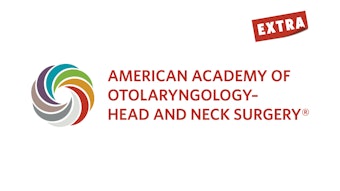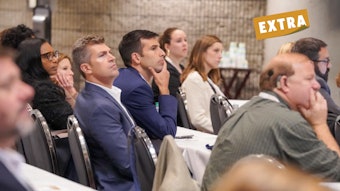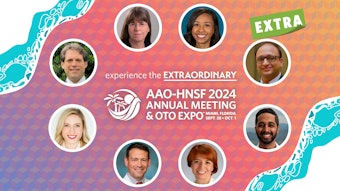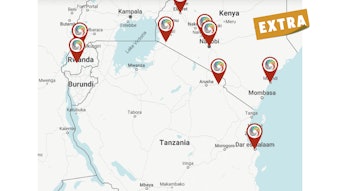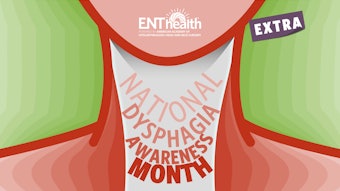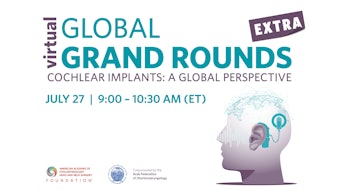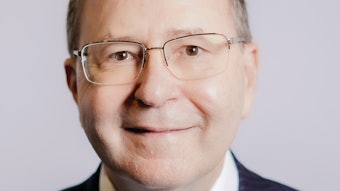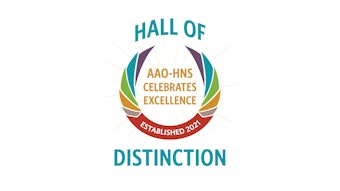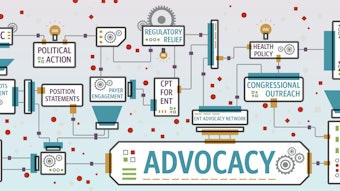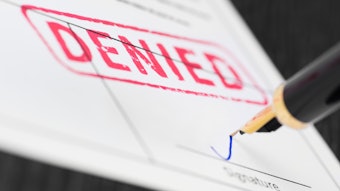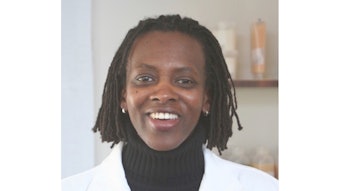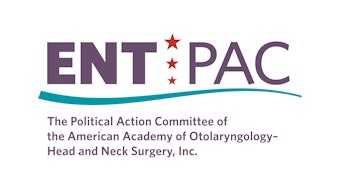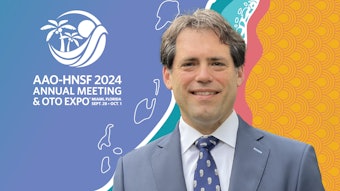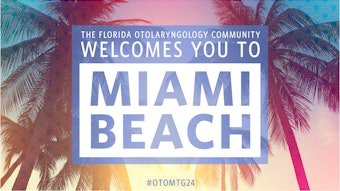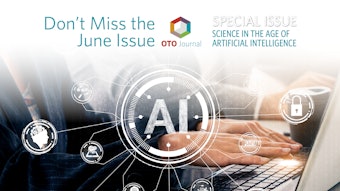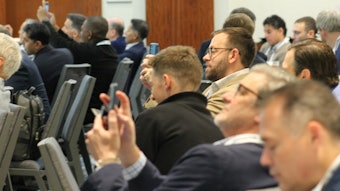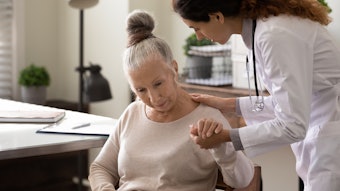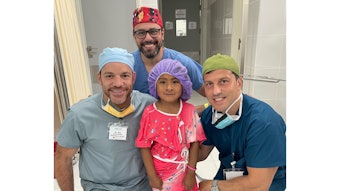Advocating for Our Future: The Time Is Now to Give
Donating your time, talent, and funds to the Academy’s advocacy efforts will determine our overall success as a specialty and our future.
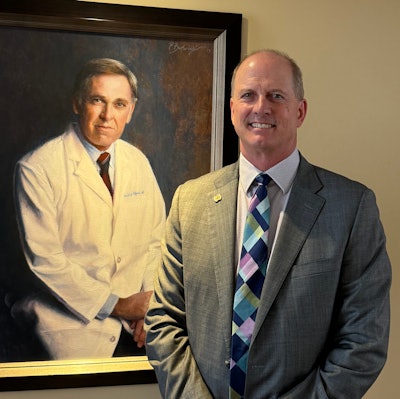 Dr. Backous poses next a portrait of his mentor, the late Bobby R. Alford, MD, former Baylor College of Medicine Chancellor and Distinguished Service Professor.
Dr. Backous poses next a portrait of his mentor, the late Bobby R. Alford, MD, former Baylor College of Medicine Chancellor and Distinguished Service Professor.
In this issue of the Bulletin, our Advocacy team, led by AAO-HNS Coordinator R. Peter Manes, MD, and Senior Director Maura Farrell, highlights the multiple approaches we are deploying to ensure that the voices of otolaryngologists in all types of practice are represented to policymakers. In a year of uncertainty, there is potential to change healthcare dramatically. This is the time to be fully engaged in advocacy efforts on a personal, organizational, health system, and Academy level.
Prior to becoming your President, I attended the Executive Leadership Program in Health Policy and Management at Brandeis University, which was supported through the American College of Surgeons (ACS) and AAO-HNS Health Policy Scholarship. This was an amazing, executive-style course that taught me about the language and methods to move policy through regulators and legislators.
Politics is about the negotiations that happen among different stakeholders at the federal, state, or local levels to agree on policy to address specific issues. Policy refers to the actual implementation and administration of the directives generated as a result of political decision making. How we influence policy development and resource allocation by bringing awareness to a set of issues can take place at all levels of government and with regulators. This is the definition of advocacy that is the basis for and reflects the Academy’s efforts on behalf of all otolaryngologists and their patients.
Earnest et al. define physician advocacy as, “Action by a physician to promote those social, economic, educational, and political changes that ameliorate the suffering and threats to human health and well-being that he or she identifies through his or her professional work and expertise.”1
Physicians garner trust within our social structure that is afforded to few other professionals. The combination of a high level of knowledge, exceptional credibility with policymakers, and an ability to tell compelling, real-life stories from our daily patient care experiences makes us both influential and helpful to our elected officials as they prioritize constant demands for resources.
Our AAO-HNS/F Advocacy team serves us on many levels. Staff and volunteers from our membership address reimbursement issues, payment policies, and engage our committees and coordinators to assist in defining medical indications for leading-edge interventions.
The Academy engages with the Food and Drug Administration, the Centers for Medicare & Medicaid Services (CMS), and the Centers for Disease Control and Prevention (CDC) to provide expertise as these organizations work to generate appropriate regulations that protect our patients while also fostering access to care and innovation.
Our representatives on the Relative Value Update Committee (RUC) and our Physician Payment Policy (3P) Workgroup combine to develop Current Procedural Terminology (CPT) language that accurately describes the services provided so that they can be presented by our RUC team for valuation.
The Academy develops and maintains Position Statements that are essential tools in advocacy efforts at the national and state levels as well as working with payers to allow our patients to have access to the most appropriate treatments for them. These statements are also critical to protecting patient’s access to appropriate care during the recent onslaught of inappropriate expansion of clinical privileges without the requisite training as well as to delineate a statement, policy, or declaration on a particular topic or topics. Statements are created to formalize the AAO-HNS/F position on a clinical procedure or medical service with third party payers, for use in state and federal regulatory or advocacy efforts, or to clarify the AAO-HNS/F approval or disapproval of certain practices in medicine.
We also engage industry leaders, when appropriate, to ensure that our practical knowledge is available to drive product innovation and help them bring those products to market and make them available to patients by getting insurance coverage.
Finally, our ENT PAC* puts aside political affiliation to supports lawmakers who champion policies that enrich our specialty while protecting our patients.
Within all of this potential lies the challenge of engaging each of our members in a meaningful way to ensure that patients will always receive the best otolaryngology care—whoever they are and wherever they live. Social determinants of health are real and only together can we address them.
The Board of Governors supports our grassroots efforts, such as the State Trackers program and Project 535. Our ENT PAC Board of Directors shows no partisan bias as they allocate your donations. Our Advocacy team is always looking to create synergies for better lobbying outcomes with other medical societies.
This October, Lance A. Manning, MD, will take over as Coordinator for Advocacy for the AAO-HNS. This ends a seven-year run by Dr. Manes, who is one of this year’s CEO Above and Beyond recipients. Thank you, Peter, and may your service to the Academy continue to grow. Although he has big shoes to fill, Dr. Manning is well equipped to thrive in his new role. Lance, we are with you, and look forward to your consistent and informed leadership.
The determining factor for the success of the Academy’s advocacy work for the specialty is the willingness of each and every member to donate time, talent, and money to this endeavor. I continue to be blessed to be an otolaryngologist and want many generations after me to have the same opportunities I have had throughout my career. Bobby R. Alford, MD, my mentor and AAO-HNS/F Past President, challenged all of us who trained with him to give more than we receive from the specialty. Now is a great time to heed his advice. Each of us can make a difference. Please take a few minutes to read this issue of the Bulletin and find a way to exercise your personal influence to make us all stronger. Together we are one.
Note: Contributions to ENT PAC are not deductible as charitable contributions for federal income tax purposes. Contributions are voluntary, and all members of the American Academy of Otolaryngology–Head and Neck Surgery have the right to refuse to contribution without reprisal. Federal law prohibits ENT PAC from accepting contributions from foreign nationals. By law, if your contributions are made using a personal check or credit card, ENT PAC may use your contribution only to support candidates in federal elections. All corporate contributions to ENT PAC will be used for educational and administrative fees of ENT PAC, and other activities permissible under federal law. Federal law requires ENT PAC use its best efforts to collect and report the name, mailing address, occupation, and the name of the employer of individuals whose contributions exceed $200 in a calendar year. ENT PAC is a program of the AAO-HNS which is exempt from federal income tax under section 501 (c) (6) of the Internal Revenue Code.
Reference
- Earnest, Mark A. MD, PhD; Wong, Shale L. MD, MSPH; Federico, Steven G. MD. Perspective: Physician Advocacy: What Is It and How Do We Do It? Academic Medicine 85(1):p 63-67, January 2010. | DOI: 10.1097/ACM.0b013e3181c40d40
